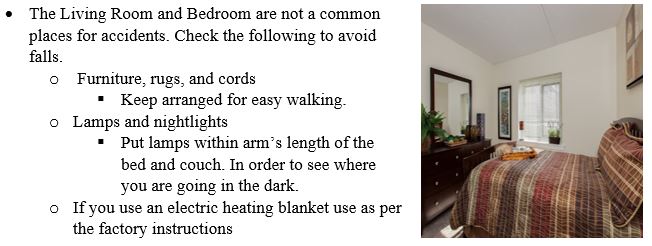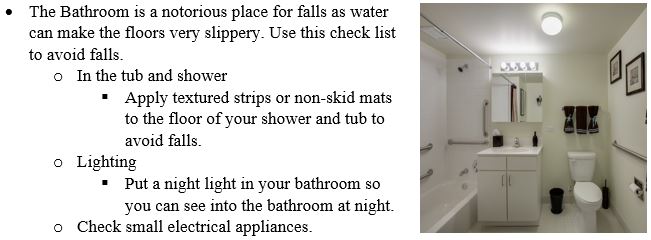Your quality of life is our primary concern. Despite the odds, we fortunately have not had one resident diagnosed with COVID-19.
Fun activities you can do while in quarantine
COVID-19 Response
Notice to all Residents:
Recently, we have had a few questions from our residents concerned about the pandemic sweeping the world. We view it as our shared responsibility to rely on the facts, remain calm, and take appropriate precautions recommended by the Centers for Disease Control and Prevention. To prevent the potential spread of the Novella Coronavirus the following policies will be implemented:
Effective immediately our offices will be locked and open by appointment only. We are asking you to call or email with questions or concerns. Office hours will remain as usual.
All social functions are cancelled until further notice. Following CDC guidelines, we are discouraging all gatherings. Community areas (other than laundries) will be closed to allow maintenance to focus on cleaning entrance areas.
To limit interaction, all maintenance requests will be limited to emergency procedures. Work orders that do not meet those guidelines will be accepted at a later date.
Additionally we are constantly monitoring and implementing policies based on the recommendations of national and state agencies. We highly recommend you remain educated and calm during this time.
The City of Chicago
The Illinois State Government
The Centers for Disease Control and Prevention
We appreciate your cooperation during these challenging times and remind you to follow the suggested social behaviors below:
Stay Healthy,
Management
The Hidden Health Benefits of your Morning Coffee
For many people across the world coffee is an essential part of their day. For coffee drinkers it gives them the energy to tackle the day but it is more than that. It is the soothing feeling of a warm mug in your hands and the rich aroma that greets you every morning. However, have you ever stopped to think about the health benefits? Several studies have shown that coffee consumption is good for both the body and soul.
Pep in your Step
It is no hidden fact that coffee puts a little pep in your step but that extra pep goes a long way in improving various aspects of brain function such as;
Enhancing your memory
Improving your mood
Increases your energy levels and reaction times
Helps you fight depression
Not only does the extra pep help your brain function but it also aides in helping you improve your physical performance and burn fat
Rich Nutritious Rewards
For many years man has sought to find the fountain of youth and has failed. In their quests nutritionists have found that several nutrients are required to help your body function. Coffee has an abundant source of the essential nutrients that your body requires. A single cup of coffee contains;
Vitamin B2. B5, and B3
Manganese
Potassium
Magnesium
Disease Deterrent
According to Harvard Health coffee has been among the most heavily studied drinks. Evidence from the studies suggests that moderate coffee consumption of three to four cups per day have been linked to a longer lifespan. Since the studies have determined that coffee drinkers may have a reduced risk of;
Cardiovascular Disease
Type Two Diabetes
Parkinson’s Disease
Uterine and Liver Cancer
Cirrhosis
Gout
Depression
Like what you read? Please like and share below! Also leave us a comment on what you would like us to write about.
Like what you read? Learn more about the health benefits of coffee at Healthline.
Common Accidents Among Seniors and How to Avoid Them
In everyone’s walks of life there are hazards and as our age increases so do the hazards. Statistics show that the majority of senior’s accidents take place in their homes. Frequently accidents take place in the kitchen, bathroom, and bedrooms. However, knowing the common accidents that may occur in your home and how to avoid them is half the battle. Fixing these simple overlooked hazards can save you from a accident.
Hazard Zones
Please review these ares in your homes for hazards and check them off as you go along.
Walkways
Kitchen
Living Room and Bedroom
Bathroom
Like what you read? Please like and share below! Also leave us a comment on what you like us to write about.
Remaining Sharp as you Age
Everyone has an incidental Senior Moment. Perhaps you’ve gone into a room and do not remember why, or have misplaced something. Do not fret memory lapses can occur at any age and it is natural to have them from time to time. However, when significant memory loss is noticeable, it is typically not due to aging but organic disorders, brain injury, or neurological illness. Please see a doctor if you have observed these traits in yourself or a loved one. Now several studies have shown that you can help prevent memory lapses and reduce the risk of dementia with brain stimulation and basic good health habits.
Keeping your body and mind healthy
Healthy Habits
Remain physically active.
Examples include; riding a bike, swimming at a slow pace, walking briskly, jogging slowly, using a treadmill, and dancing.
Get enough sleep
It is during sleep that our body and mind regenerates itself.
Do not smoke or drink excessively.
Both hinder higher brain functionality.
Eat a balanced diet low in saturated trans fats.
Choosing the correct foods makes a substantial impact on your brains functionality. Foods such as leafy greens, avocados, and berries have all been linked to positive brain health.
Brain Stimulation
By keeping your mind active it will keep you sharp and reduce your senior moments.
Keep learning
Challenging your brain with mental exercise is believed to help preserve brain cells and stimulate communication among them. Try pursuing a new hobby, learning a new skill, puzzles, mental math, and drawing.
Use all of your senses
The more senses you use in learning something your brain will become more involved in retaining the memory. For example your recall on songs is much stronger compared to when you memorize something without a tune. This is because you are using two senses hearing and singing the lyrics.
Repeat what you want to remember
When you want to remember something you’ve just heard, read, or thought about repeat it out loud and write it down. By doing so you have reinforced your memory.
Consistency in your memory habits
Repetition is the most crucial step in memory preservation when it is properly timed. It is not best to repeat something in a short period. By spacing out periods of mental stimulation it helps you improve your memory and is particularly valuable when you try to master complicated information.
Like what you read? Please like and share below! Also leave us a comment on what you like us to write about.
The Benefits of Indoor Plants
As winter continues it is easy to miss the colors of the outdoors. Spruce up your home with an indoor plant and bring some of color back into your life. Not only are indoor plants aesthetically pleasing but they also provide a breath of fresh air. Live plants interact with your body and soul to enhance your quality of life.
A Breath of Fresh Air
As you breathe your body takes in oxygen and releases carbon dioxide. Which the plant absorbs and releases oxygen. This pattern makes plants and people natural partners. By sprucing up the indoors with color you are also increasing your oxygen levels in your home, helping you breathe easy.
Purifies the Air
We spend the majority of our lives indoors, so the quality of your air indoors is essential. Plants are the world’s first air purifier. They naturally remove various toxins from the air and break them down into harmless byproducts. Sources of air pollutants can be found in everyday items such as; fuels, furnishings, and clothing.
Types of Indoor Plants
Written By: Karlie Kudrna
National Glaucoma Awareness
January is National Glaucoma Awareness Month and is an important time to spread the word about the vision stealing disease. Glaucoma is a rising epidemic as it affects nearly three million people in just the United States and accounts for up to 12% of all cases of blindness. Glaucoma is a group of eye diseases that gradually steals your vision. The disease is nicknamed “the sneak thief of sight” as it has no symptoms and once your vision is lost, it is permanent. Early detection is vital to stopping the progression of this disease. With a proper diagnosis medication or surgery can slow or prevent further vision loss.
Risk Factors
As stated by leading Ophthalmologists and the American Academy of Ophthalmologist there are several groups that are at higher risk for Glaucoma.
People whom are:
Over the age of 60,
Siblings of persons diagnosed with glaucoma
Are of African, Hispanic or Asian heritage
If you have high eye pressure
Have had an eye injury
Diabetics
Individuals who are severely nearsighted or farsighted
If you have high blood pressure or poor blood circulation
If you qualify for more than one of these risk factors you may have a heightened risk of Glaucoma and should speak with an Ophthalmologist.
How to prevent symptoms of Glaucoma
Early diagnosis Glaucoma is vital and periodic comprehensive eye examination with an Ophthalmologist will help. If recognized in the early stages Glaucoma medications and surgery can slow the progression of the disease. For further research refer to the following websites.
The Mayo Clinic
The American Academy of Ophthalmology
Written by: Karlie Kudrna
Communicating With Loved Ones Who Have Alzheimer’s
When a loved one is diagnosed with a severe life altering disease such as Alzheimer’s or dementia it is indescribably painful. Knowing that you will have to witness the deterioration of a loved one’s mental state. However, learning how to communicate with your loved one as their disease advances is important and rewarding. Here are some communication tips from the Alzheimer’s Association.
Don’t Say Remember Frequently your loved one will be unable to remember various life events or people. By pointing out their inability to do so you will frustrate them. Instead of saying remember speak in statements that will help them remember. For example, say “This is your John, your grandson” not “Do you remember John”. Also when reminiscing about life events show them pictures to jog their memory.
Don’t Argue with Them Instead the best technique is to redirect or validate their feelings rather than to argue. Doing so will let them know they are not alone. For example, “I understand that you want to go home. Could you tell my more about your home?” Then offer to take them on a walk.
Telling them about a deceased loved one Frequently our loved ones with Alzheimer’s will ask or make a comment about a deceased family member or friend. In these situations you are uncertain whether or not you should tell them the unfortunate news. The best approach is to ask them what their favorite memories are with that person. By doing so you will redirect them into another thought, allowing them to relive their happiest memories rather than flooding them with confusion and pain.
Speak Calmly and Slowly Your loved one with Alzheimer’s will mirror your emotions and they need time to process what you are saying. Speak at half your normal speed and take a breath between each thought. By doing so you will foster a better conversation and will maintain their attention.
Talk About One Topic at a Time In order to avoid your loved one’s confusion and frustration speak to them about a single topic at a time. Also do not feel bad when you have to remind them what you are talking about or repeating yourself. Additionally, in order to maintain their concentration choose a setting that won’t be distracting or noisy. This will allow for a more fluent conversation.
Giving Thanks
Laughter Is Still The Best Medicine
Remembering The Lost
Losing a loved one is one of the most traumatic times of your life. The person you’ve done everything with is departed and thoughts of depression take over your mind. Albeit you understand that they are in a better place you are left deeply hurt that they are gone. However, know that your loved one is not truly departed, they live on in you and the ones they touched during their lifetime. So seek council in your family and friends, you should not experience this pain alone.
Honoring Your Loved One
Take Flowers to Their Memorial Site
When taking flowers to a loved one’s memorial site it is an act of remembrance. This simple act allows you to reflect on your memories with them and enables you to catch them up on current events in your life. Keeping them up to date on your life will make it seem as if they were there
Review Old Photos
Photo albums are a great way to review cherished times with your loved one. Reminiscing on past events can bring up happy times and laughable moments. Like that awful outfit that was stylish for the times.
Cook Your Loved Ones Favorite Dish
Everyone has a comfort food that is sure to put a smile on their face. Make your loved ones favorite dish and share it with others to see the joy on their face. The joy that once was theirs can now be shared with everyone.
Go to Your Favorite Place You Shared With Them
Revisiting your most cherished places that you and your loved one spent all of your time is a great way to review the joyous moments your shared.
Write a List of Things They Loved
By writing a list of your loved ones likes it allows you to remember and review everything they loved about life. When you find it hard to remember everything that made your loved one smile review the list or do something on it.
Written By: Karlie Kudrna
Dog Ownership For Seniors
We are very proud to have been featured in the spring 2018 edition of Affordable Housing News.
Click below to view the article.
The Montclare Senior Residences Healthy Eating Blog
By Kathy Nuss, Pacific Management.
Making small changes that impact your health!
More and more studies are showing that turning to a plant base diet can help in so many areas of our health.
That is not to say that we should become vegetarians or vegans, but increasing our intake of vegetables and fruits. New studies show that adding broccoli and cauliflower will help decrease plaque build up in the carotid artery. Small changes can make a huge impact.
Start with substituting some side dishes with fresh cooked vegetables. If you are not used to vegetables, try including vegetables in with rice, soups, pastas, stews, etc.
Adding more vegetables and fruit will impact other serious conditions associated with obesity, diabetes, and heart disease.
Try new vegetables, become adventurous. The more colors and variety will hopefully keep you motivated to maintain the healthy changes.
In the summer look for local farmers markets. Not only are they great places to purchase fresh produce but fun to walk around and enjoy the variety of the choices.
Share new recipes or ideas with the office staff! Your recipes will be shared in our newsletter.



















